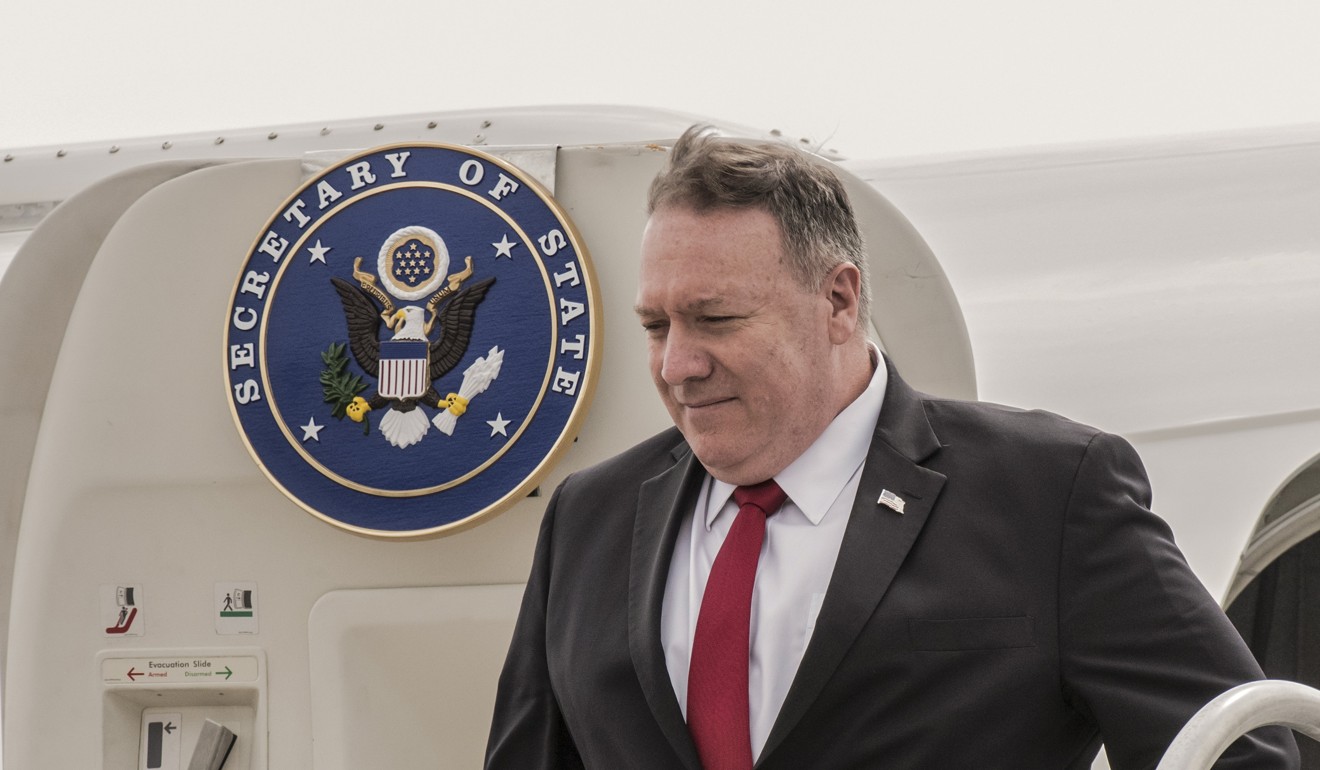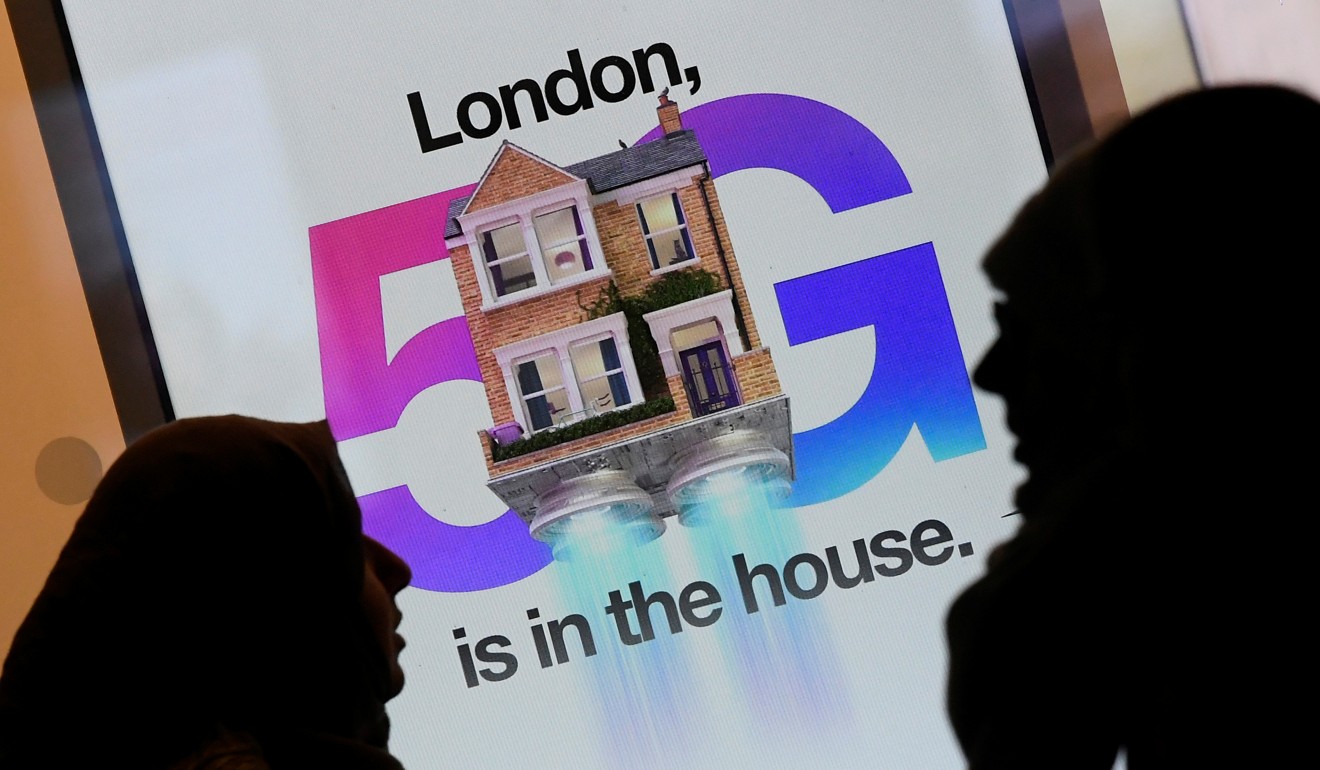
UK Huawei 5G decision: will there be blowback from ‘disappointed’ ally US?
- Prime Minister Boris Johnson has been touting prospects of a big trade deal US after Brexit
- But UK decision over Huawei’s role in 5G network could complicate ‘special relationship’
US Secretary of State Mike Pompeo was to arrive in London Wednesday for talks with the UK Foreign Secretary Dominic Raab, following the UK’s decision to ignore US threats and allow Huawei a limited role in the country’s 5G network. But as of late Tuesday, all signs indicated that a full-blown row between the two allied powers had been averted.
With the UK due to leave the European Union on Friday, the government is hoping for speedy talks with the US to secure a transatlantic trade deal. At the same time it has pledged to roll out fast broadband across the country and maintain growing business ties with China.
The US has been lobbying London hard to exclude Huawei from its networks, threatening to withdraw cooperation within the Five Eyes intelligence sharing network if it failed to do so.
Australia and the US have already banned the Shenzhen-based company from 5G. The other two members of the alliance, Canada and New Zealand, have yet to decide on Huawei’s role in their 5G plans, but could follow the UK’s lead.

The UK strategy, which seeks to bide time while Western telecoms companies catch up with Huawei in technology and prices, appears to have angered the US but not ruptured the “special relationship” that goes back decades.
Unnamed US officials in a terse statement said the US was “disappointed” by the UK’s decision and would continue to press its allies on the matter.
In a phone call with US President Donald Trump, Prime Minister Boris Johnson “underlined the importance of like-minded countries working together to diversify the market and break the dominance of a small number of countries”, the UK government said in a statement.
Whitehall sources told The Daily Telegraph, the newspaper Johnson used to write for, that the prime minister and Trump also agreed to work together to “break the dominance” of companies like Huawei, with the ultimate aim of squeezing it out of the UK’s telecommunications network altogether.

Nevertheless, several senior Republicans took to Twitter to criticise the UK’s decision.
Congresswoman Liz Cheney – daughter of former vice-president Dick Cheney – wrote that Johnson “has chosen the surveillance state over the special relationship. Tragic to see our closest ally, a nation Ronald Reagan once called ‘incandescent with courage’, turn away from our alliance and the cause of freedom.”
“The decision by @BorisJohnson to allow Huawei into the UK’s telecommunications network is wrong, dangerous, and a grave shortsighted mistake. Congress must work on a bipartisan basis to push back on this decision by the UK to open their arms to China’s surveillance state,” tweeted Congresswoman Elise Stefanik, a close ally of Trump.
Newt Gingrich, the former speaker of the US House of Representatives said the decision to accept Huawei for 5G was a major defeat for the United States.
“How big does Huawei have to get and how many countries have to sign with Huawei for the US government to realise we are losing the internet to China? This is becoming an enormous strategic defeat,” he tweeted.
The decision by the UK government also incited criticism from some very senior Conservatives in Johnson’s own party. The newly knighted Iain Duncan Smith, a former leader of the Conservative Party, accused the prime minister of ignoring warnings from security allies, saying that “even Vietnam does not want Huawei”. Vietnam said recently it was developing its own 5G network.
Raab poured cold water on the idea that the involvement of Huawei in 5G would affect the sharing of top-secret information.
“Nothing in the review affects this country’s ability to share highly sensitive intelligence data over highly secure networks, both within the UK and with our partners, including the Five Eyes,” Raab told the House of Commons. He said the UK’s technical security experts “have agreed that the new controls on high-risk vendors are completely consistent with the UK’s security needs”.
“The threats to our networks are many and varied, whether from cybercriminals or state-sponsored, malicious cyber-activity. The most serious recent attack on UK telecoms has come from Russia, and there is no Russian equipment in our networks,” Raab said.
Monaco launches Huawei-built 5G network in Europe first
Western telecommunications companies estimate that stripping out existing Huawei equipment would cost £6 billion (US$7.8 billion), hold up the roll-out of 5G by at least 18 months and cause a £4.5 billion hit to the economy.
The UK’s four mobile network operators – EE, O2, Three and Vodafone – have launched 5G services over the past six months, all involving some Huawei equipment. Each company will be subjected to the 35 per cent cap.
There are only two principal alternatives: Ericsson and Nokia, from Sweden and Finland respectively, but Huawei is much cheaper.
The UK and the US both had their eyes off the ball when China surged ahead to become the world leader in 5G after billions of dollars of government investment in research. The US is mooting a plan to subsidise research to the tune of one billion dollars, a sum many say is too little too late.
“There are some pretty bold risks being taken by the UK – it seems – to more or less ignore the evidence that has been found in East Europe of Chinese signalling intelligence in that it couldn’t happen in the UK,” Hosuk Lee-Makiyama, director of the European Centre for International Political Economy in Brussels and a former Swedish diplomat told South China Morning Post.
US and Poland sign 5G security agreement as part of effort to block Chinese telecoms giant Huawei from European networks
He cited an incident in Poland last year involving a Huawei employee who was arrested on suspicion of spying for the Chinese government.
Huawei later fired Chinese sales director Wang Weijing and said that the employee’s alleged criminal activity was unrelated to his work for the firm.
The European Union executive was due to announce “a toolbox” – guidelines to help member states in their dealings with Chinese phone companies.
Around 20 EU countries have partnered with Huawei in their 5G roll-out, on similar terms to those adopted by the UK, including France and Italy. Germany is due to decide soon, with Chancellor Angela Merkel’s plans to use Huawei facing opposition from German politicians.
The UK Parliament will debate the issue again when the government puts forward a bill to enable it to restrict the market share of “high-risk vendors”.

